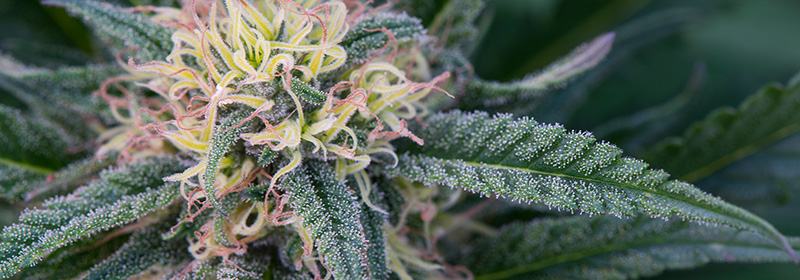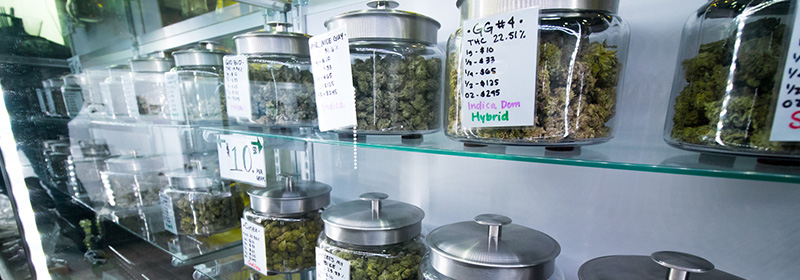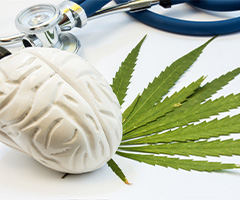Medical Cannabis: A Holistic Approach to Healing

Medical cannabis, also known as medical marijuana, has been a topic of great interest and debate in recent years. It is a plant-based medicine that has been used for centuries in various cultures for its therapeutic properties. However, in recent history, there has been a substantial increase in both its medical and recreational use. This increase has led to a wealth of data on its therapeutic effects and overall impact, as well as a myriad of legal issues.
In this blog series, we will delve into different aspects of medical cannabis, exploring its healthcare applications, legal status, history, and effects of use. Each of these four topics will be introduced below and will be dicussed in more depth in the subsequent blogs of this series. At the end of this introductory blog, we will discuss some of the ongoing research in the field of medical cannabis.
Healthcare Applications
Recent research has reignited interest in medical cannabis, and scientists have been uncovering its potential therapeutic benefits. Here are some of the key areas where medical cannabis is making an impact:
- Pain Management: Medical cannabis is well-known for its ability to alleviate chronic pain, making it a valuable option for individuals suffering from conditions like arthritis, neuropathy, and fibromyalgia. The compounds in cannabis, such as THC and CBD, interact with the body’s endocannabinoid system to modulate pain perception.
- Nausea and Vomiting: Medical cannabis is often used to manage nausea and vomiting caused by chemotherapy in cancer patients. It can help improve appetite and overall well-being in individuals undergoing cancer treatments.
- Neurological Disorders: Some studies suggest that medical cannabis may be beneficial for individuals with neurological disorders like epilepsy and multiple sclerosis. CBD, in particular, has shown promise in reducing the frequency and severity of seizures.
- Anxiety and Depression: While more research is needed, some individuals report that medical cannabis can help alleviate symptoms of anxiety and depression. It’s thought to work by influencing the brain’s neurotransmitters and receptors.
- Inflammation and Autoimmune Conditions: Cannabinoids like CBD have anti-inflammatory properties, which may be beneficial for individuals with autoimmune diseases like rheumatoid arthritis and inflammatory bowel disease.
- Sleep Disorders: Medical cannabis may also aid in improving sleep patterns and managing insomnia, offering a natural alternative to traditional sleep medications.

Legal Status
The legal status of medical cannabis varies widely from country to country and within different states in the United States. Some regions have embraced medical cannabis, legalizing it for medicinal use with varying degrees of regulation, while others maintain strict prohibition.
In the United States, as of 2023, over 40 states had legalized medical cannabis to varying extents. The federal government, however, continued to classify cannabis as a Schedule I controlled substance, creating a complex legal landscape. Recently, the DEA proposed moving marijuana to Schedule III, recognizing its medical benefits and lower potential for dependence – a significant move, but does not immediately resolve federal-state regulatory conflicts.
It’s crucial for individuals interested in medical cannabis to understand the laws and regulations in their specific jurisdiction, as these can change over time.
A Brief History
The use of cannabis for medicinal purposes dates back thousands of years. Ancient Chinese texts, Egyptian papyri, and Greek writings all mention its therapeutic effects. In the 19th century, cannabis tinctures and extracts were commonly found in pharmacies across Europe and the United States.

However, in the early 20th century, cannabis faced increasing legal restrictions and was eventually classified as a Schedule I controlled substance in the United States in 1970, making it illegal at the federal level. This move severely limited research into its medical applications.
Effects of Use
While medical cannabis shows promise in many areas, it’s not without concerns. It’s essential to consider the following factors:
- Side Effects: Like any medication, medical cannabis can have side effects, including dizziness, dry mouth, impaired coordination, and, in some cases, increased anxiety.
- Psychological Effects: High-THC strains can lead to psychoactive effects, making it unsuitable for some individuals, particularly those with a history of psychosis or substance abuse.
- Dependency: There is a potential for dependency and misuse, especially with high-THC products. Patients should be closely monitored by healthcare professionals.
- Drug Interactions: Cannabis can interact with other medications, so it’s vital to consult with a healthcare provider, especially if you are taking other prescription drugs.

Ongoing Research
One of the most exciting aspects of cannabis is the growing body of research that continues to uncover its potential benefits. As the stigma surrounding cannabis diminishes and more funding is allocated to research, we can expect to see further insights into its therapeutic applications.
Some areas of ongoing research include:
- Cancer Treatment: Studies are exploring whether cannabis can help in the treatment of various cancers, either by directly targeting cancer cells or by managing side effects of chemotherapy.
- Neurodegenerative Diseases: Researchers are investigating the potential of medical cannabis in managing conditions like Alzheimer’s disease and Parkinson’s disease, where inflammation and oxidative stress play significant roles.
- Pain Management: The opioid epidemic has led to increased interest in alternative pain management strategies, and medical cannabis is a prominent contender. Research is ongoing to determine its effectiveness in reducing opioid use and overdose rates.
- Psychiatric Disorders: The impact of cannabis on mental health conditions like schizophrenia, bipolar disorder, and post-traumatic stress disorder is an area of active investigation.
- Cannabis-Based Medications: Pharmaceutical companies are developing cannabis-based medications with standardized doses of cannabinoids, such as Epidiolex (a CBD-based medication) for epilepsy.
Conclusion
Cannabis represents a complex and evolving field of medicine with the potential to provide relief and healing to individuals suffering from a wide range of conditions. As research advances and regulations change, it’s crucial for patients and healthcare professionals to stay informed about the latest developments and evidence-based practices.
Ultimately, the use of cannabis should be a carefully considered decision made in consultation with a healthcare provider who can weigh the potential benefits and risks, ensuring that patients receive the most appropriate and effective treatment for their specific medical needs. With continued research and responsible use, medical cannabis has the potential to play an increasingly significant role in the future of healthcare.
Continue Your Education
To learn more about the healthcare applications, legal and ethical issues, history, and effects of medical cannabis, check out our Certificate in Medical Cannabis.
Medical Cannabis Series
Post 1 of 5






